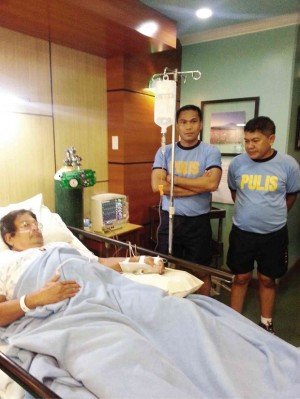
FORMER Dapitan City Mayor Dominador Jalosjos in a hospital with policemen who are serving an arrest warrant against him for his conviction in a case of robbery. CONTRIBUTED PHOTO
CEBU CITY—Former Dapitan City Mayor Dominador Jalosjos was being attended to by his doctor in a hospital on Thursday when policemen arrived with an arrest warrant for a robbery case that led to his conviction in 1970 and a jail sentence that he never got to serve.
Jalosjos, 72, decided to no longer contest his conviction after his petition to stop his arrest was denied by the Court of Appeals (CA) in a case that could best illustrate how slowly the wheels of justice grind in this country.
“We could have exhausted all other legal remedies but considering he (Jalosjos) is already at the twilight of his life, he would rather serve the one-and-a-half-year imprisonment rather than wait for the decision of the Supreme Court,” said Jalosjos’ lawyer, Inocencio de la Cerna.
But Jalosjos, owner of Dakak Beach Resort in Dapitan City, may end up serving his sentence, not at the Cebu City jail, but in a hospital because of his heart condition.
“He needs to rest for open heart surgery and later on his recovery. His confinement at the hospital, however, is interpreted as already part of his sentence,” said De la Cerna.
Executive Judge Soliver Peras of the Cebu Regional Trial Court (RTC), who issued the arrest warrant, ordered Jalosjos’ doctor, Peter Mancao, to appear in court on Jan. 29 to justify Jalosjos’ stay in the hospital.
In a medical report submitted to the court, Mancao said Jalosjos has a “coronary heart disease” that needs “immediate action for the preoperative work-up and to prepare him for surgery to repair this serious and life-threatening condition.”
Jalosjos, older brother of convicted rapist Romeo Jalosjos, was sentenced to a year and six months by the then Court of First Instance (now RTC) for involvement in highway robbery in 1969. The amount involved was P700.
The court also barred him from holding public office.
To avoid imprisonment, Jalosjos filed a petition for probation, a remedy granted by law for people convicted of an offense that carries a penalty of less than six years of imprisonment.
The court granted the probation but Jalosjos failed to comply with the requirement to regularly report to his probation officer. The court later canceled his probation and ordered his arrest.
De la Cerna said his client thought he had served his probation. But when Jalosjos ran for governor of Zamboanga del Sur province, he said Jalosjos’ political rivals dug up the records and discovered the standing arrest warrant.
“Usually, if you have a probation order, you should report to the probation officer. But he was in Dapitan City and the incident happened in Cebu, so maybe he failed to report to the probation officer,” De la Cerna said.
He said Jalosjos questioned the cancellation of his probation at the appellate court in Cebu City, which issued a temporary restraining order to stop his arrest.
The CA, however, did not issue an injunction that could have stopped for good the enforcement of the arrest warrant.
In December 2003, parole and probation administrator Gregorio Bacolod issued a certification that Jalosjos had fulfilled the terms and conditions of his probation.
The certification was used by Jalosjos to back the dismissal of the disqualification case filed against him when he ran for mayor of Dapitan City in 2004.
He was elected mayor of Dapitan for three consecutive terms, from 2004 to 2012, as a final ruling on his disqualification hanged.
Jalosjos decided to run for governor of Zamboanga del Sur in the May 2013 elections but his candidacy was questioned by his opponent, Agapito Cardino, who said the former mayor made a false representation in his certificate of candidacy when he declared under oath that he was eligible to run for public office.
The case reached the Supreme Court, which disqualified Jalosjos, saying he is perpetually barred from running or holding any elective office.
The high court ruled that Jalosjos should not have been allowed to run for public office since his criminal conviction in the 1970s rendered him “perpetually” ineligible.
The Sandiganbayan later found that Bacolod issued a falsified certification for Jalosjos and sentenced him to six years and a month to 10 years’ imprisonment and perpetual disqualification from public office for violating the Anti-Graft and Corrupt Practices Act.